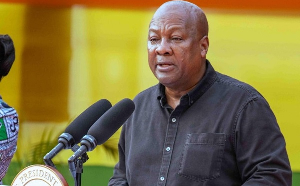Accra, May 26, GNA - Professor Kenneth Agyeman Attafuah, former Executive Secretary of the National Reconciliation Commission (NRC), on Wednesday proposed that the Commission on Human Rights and Administrative Justice (CHRAJ) be given exclusive mandate as the sole anti-corruption institution.
He said designating CHRAJ as the sole anti-corruption agency would allow for effective resource concentration, and foster efficiency and clarity, which would be in consonance with emerging international best practices.
"Under the current arrangements, there are too much cognitive confusion, forum-shopping, overlaps in investigations and turf wars arising from the existence of multiple anti-corruption agencies," Prof Attafuah stated at a National Conference on Managing Foot Soldiers in Accra. The conference organised by the Centre for Freedom and Accuracy (CFA), a civil society advocacy was on the theme: "Managing Foot Soldiers and Party Loyalists for a Sustainable Democracy and Effective Institutional Development".
It was chaired by Nana Susubiribi Krobea Asante, Paramount Chief of Asante-Asokore in the Ashanti Region.
Prof Attafuah explained that under the current situation where about five institutions were in charge of corruption, it was hardly justifiable to blame any one of the anti-corruption institutions for the high levels of real and perceived political and other forms of corruption in the country from which some of the foot soldiers' agitations arose. He said CHRAJ was the only ombudsman or administrative justice institution in Ghana by virtue of article 218 (a), which mandated it to investigate all instances of alleged or suspected corruption and the misappropriation of public moneys by officials.
Prof Attafuah called for the strengthening of national anti-corruption institutions to perform their constitutional and statutory duties."it will help reduce the penchant for political interference in the work of the police and the Serious Fraud Office in investigations, prompt arrest and prosecution of corrupt persons.
He called on the National Commission for Civic Education (NCCE) to wake up and live up to its constitutional mandate by awakening pride in Ghanaian citizenship, promote civic awareness that included commitment to decency, integrity and anti-corruption.
Dr Emmanuel Akwetey, Executive Director of the Institute of Democratic Governance (IDEG), noted that with the recent development and agitation by foot soldiers, "they seem to assume some form of power which the parties the fear - they claimed electoral victories but not electoral defeats". "How come they were able to convince 17 potential Presidents during the then ruling New Patriotic Parties Presidential Primaries in 2007 to win the party's flag bearer slot.we all know the outcome, who should we blame for the defeats," he added.
Dr Akwetey called for scientific interrogation of the claim by foot soldiers as being king makers "If the NDC foot soldiers are claiming the party's electoral victory, should we blame their counterparts in NPP and other minority parties for their defeat in Elections 2008?" He called for stronger condemnation of the action of the NDC foot soldiers by cross section of the Ghanaian society. "we must speak-out with one loud voice against the criminal activities of the foot soldiers". Dr Akwetey urged the parties to differentiate between elections and post election governance; adopt different culture of inclusiveness in governance, intensify civic education and create a platform for NCCE and political parties to collaborate.
Mr Andrew Awuni, CFA Executive Director disclosed that foot soldiers of political parties outside government were seriously taking notes and would visit them with some new tricks whenever their parties come to power. He said the foot soldier phenomenon was an organisational product of politics that demonstrated a certain structural defect in the democratic governance in which government, State and the parties were erroneously seen as one and the same. Mr Awuni, a former Presidential Spokesperson to President John Agyekum Kufuor, noted that foot soldiers were not different from other special interest groups, like the religious groupings, ethnic groupings, and campaign financiers all of whom were able to exact their bargains for contributions they made to any party especially when that party was elected to power. "Foot soldiers must also be compensated with positions, projects, mineral concessions, divested state enterprises or one kind of favour or the other after the elections," he said. 26 May 10
General News of Wednesday, 26 May 2010
Source: GNA












